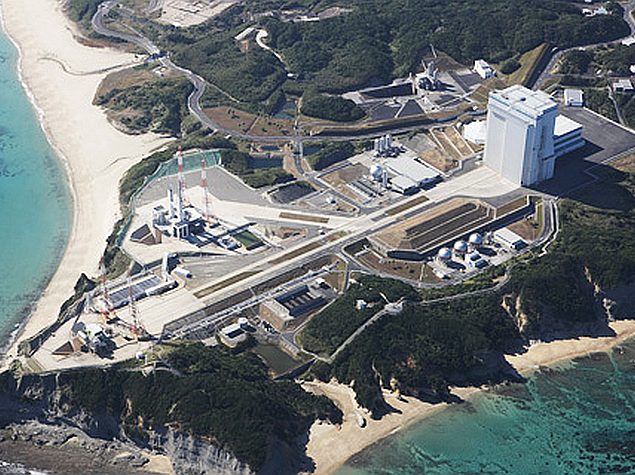- Home
- Science
- Science News
- Japan Readies Hayabusa2 Asteroid Probe for Lift Off
Japan Readies Hayabusa2 Asteroid Probe for Lift-Off

Japan will send a space probe this weekend on a six-year mission to mine a distant asteroid, just weeks after a European spacecraft's historic landing on a comet captivated the world's attention.
Hayabusa2 is set to blast off aboard Japan's main H-IIA rocket from Tanegashima Space Center in southern Japan on Sunday.
The 31 billion yen ($260 million) project is sending the kit towards the unpoetically-named 1999 JU3 asteroid in deep space.
It will blast a crater in the asteroid to collect virgin materials unexposed to millennia of solar wind and radiation, in the hope of answering some fundamental questions about life and the universe.
"The asteroid is carbonaceous and we may find organic matter and water, the stuff of life," Hitoshi Kuninaka, project leader at the Japan Aerospace Exploration Agency (JAXA), said in an interview posted on the agency's website.
(Also See: Asteroid With Comet-Like Tail Forces Scientists to Reconsider Theories)
Analysing the extra-terrestrial materials could help shed light on the birth of the solar system 4.6 billion years ago and offer clues about what gave rise to life on Earth, he said.
Hayabusa2, about the size of a domestic refrigerator, is expected to reach the asteroid in mid-2018 and will spend around 18 months studying the surface.
It will also drop tiny MINERVA-II rover robots as well as a French-German landing package named Mobile Asteroid Surface Scout (MASCOT) for surface observation.
Galactic first
In a galactic first, Hayabusa2 will drop an "impactor" that will explode above the asteroid's surface and fire a metal bullet into the crust at a speed of 7,200 kilometres (4,500 miles) an hour -- six times the speed of sound on Earth.
The bullet is expected to create a small crater that will enable the probe to collect material from the asteroid.
"The impactor is made fully with Japanese technologies that are so advanced you would think they are out of this world," said Kuninaka.
The Hayabusa2 mission will blast off just weeks after the European Space Agency succeeded in making mankind's first-ever landing on a comet this month.
Scientists said initial data sent from the robot lab Philae showed traces of organic molecules and a surface much harder than imagined.
Philae, released from its mothership Rosetta, has gone into hibernation on comet 67P/Churyumov-Gerasimenko, having used its onboard battery power after 60 hours of prodding and probing.
Engineers hope the lander's solar panels will charge its batteries in the coming months as the comet, with Philae hopefully still clinging to its surface, moves closer to the Sun.
If the Hayabusa2 mission goes well, pristine asteroid samples will be returned to Earth in late 2020.
JAXA aims to bring 100 milligrams (1/286th of an ounce) of samples to Earth after a round trip of more than five billion kilometres.
The probe is the successor to JAXA's first asteroid explorer, Hayabusa -- the Japanese term for falcon -- which returned to Earth in 2010 with dust samples after a trouble-plagued seven-year mission.
The spherical 1999 JU3 asteroid, which is around a kilometre (half a mile) across, is believed to contain significantly more organic matter and water than the potato-shaped rock studied by the original Hayabusa.
Despite various setbacks during its epic seven-year odyssey, including intermittent loss of communication and damage to its motors, the first Hayabasa was hailed as a triumph of science when it returned to Earth.
For the latest tech news and reviews, follow Gadgets 360 on X, Facebook, WhatsApp, Threads and Google News. For the latest videos on gadgets and tech, subscribe to our YouTube channel. If you want to know everything about top influencers, follow our in-house Who'sThat360 on Instagram and YouTube.
Related Stories
- Galaxy S24 Series
- MWC 2024
- Apple Vision Pro
- Oneplus 12
- iPhone 14
- Apple iPhone 15
- OnePlus Nord CE 3 Lite 5G
- iPhone 13
- Xiaomi 14 Pro
- Oppo Find N3
- Tecno Spark Go (2023)
- Realme V30
- Best Phones Under 25000
- Samsung Galaxy S24 Series
- Cryptocurrency
- iQoo 12
- Samsung Galaxy S24 Ultra
- Giottus
- Samsung Galaxy Z Flip 5
- Apple 'Scary Fast'
- Housefull 5
- GoPro Hero 12 Black Review
- Invincible Season 2
- JioGlass
- HD Ready TV
- Laptop Under 50000
- Smartwatch Under 10000
- Latest Mobile Phones
- Compare Phones
- Huawei Pura 70 Pro+
- Huawei Pura 70 Ultra
- Tecno Camon 30 Premier 5G
- Motorola Edge 50 Fusion
- Oppo A1i
- Oppo A1s
- Motorola Edge 50 Ultra
- Leica Leitz Phone 3
- Asus ZenBook Duo 2024 (UX8406)
- Dell Inspiron 14 Plus
- Realme Pad 2 Wi-Fi
- Redmi Pad Pro
- Cult Shock X
- Fire-Boltt Oracle
- Samsung Samsung Neo QLED 8K Smart TV QN800D
- Samsung Neo QLED 4K Smart TV (QN90D)
- Sony PlayStation 5 Slim Digital Edition
- Sony PlayStation 5 Slim
- IFB 2 Ton 3 Star Inverter Split AC (CI2432C323G1)
- Daikin 1 Ton 3 Star Inverter Split AC (FTKL35UV16W+RKL35UV16W)

















